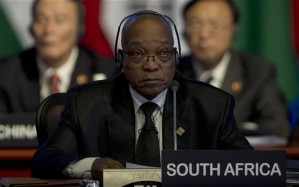
For some the G20 is synonymous to political symbolism, for others the G20 yields much influence in setting agendas for the global economy through the framing of discourses and the prioritisation of some ideas and policies over others. South Africa is the only African member of the G20, and brings with it the – at times, burdening – ‘first in Africa’ label. Although the African power is internationally of a relatively small economic and political weight, it has taken on an representative role within the G20.
First and foremost, South Africa takes up a leadership position, although with no formal mandate from African states to highlight regional or continental issues. While demanding a more balanced agenda, South African has the opportunity to bring to the fore new perspectives and orientate G20 discussions towards the Global South. Some have claimed that this so-called African power has a ‘moral obligation’ to conduct this role of spokesperson, while others have warned against the birth of an African hegemon. These assumptions, whether verifiable or not, do not take away from the fact that an African nation has the real potential to shape global economy dialogs, as it sits at the same level as the most developed and strongest emerging economies in the world. An African voice also becomes an essential strategic point for the G20 itself, with regards to its legitimacy.
The G20’s longevity is reliant on legitimacy and the unity of its diverse membership. It is a central task to ensure that Africa is permanently represented to perpetuate this legitimacy. This is further reinforced by the two allocated guest seats attributed to African nations every year, one being granted to the Chair of the African Union and the other to a NEPAD (New Partnership for Africa’s Development) representative. In 2014, it is Mauritania as the 2014 chair of the African Union and Senegal, as a NEPAD member, who join the discussions and attempt to bring their perspective to the G20 table and raise awareness on how the group’s decisions can directly affect them.
After chairing the group in 2007, South Africa has been nominated to co-chair several G20 Working Groups such as the 2010 IMF Reform Working Group, the 2011 Development Working Group which it currently chairs alongside Australia, Russia and Turkey. Within this initiative, South Africa has the potential to contribute to the G20’s Growth and Resilience agenda by focusing on the continent’s low income countries and more specifically on sub-Saharan Africa.
While G20 members had a nationally-driven African strategy, the group itself did not have a combined African agenda up until recently. This has changed through the 2014 Australian G20 Presidency. Thanks to South Africa’s growing reputation, international profile and actions taken in G20 Working Groups, Africa is seen as a new centre of demand, central to future G20 objectives. Australia’s move to establish a structured G20 African policy as a priority does not come across as a philanthropic gesture but rather as a response to re-balance the global economy to pre-2008 levels. Australia’s G20 Sherpa Dr Heather Smith notes:
“Stability as it the core of what we are trying to achieve. We accept that the financial crisis was created in developed economies but we are all connected. We need Africa to be part of the change because the poorest of the poor were the hardest hit.”
Our global economy has not seen the end of challenges and crises, yet the prospect of a successful and growing Africa have changed G20 members’ perspective on the continent. Africa is no longer perceived as a charity case but rather as a promise; a promise for prosperous emerging markets and future leading economies striving for a stable world and economy.
However South Africa should not rest on its laurels, challenges still exist as this – although positive – input still remains in the realm of rhetoric. In order to ensure its conversion into common practice, South Africa needs to continually seek partnerships and cooperation with fellow developing and developed members to promote not only its own interests but the continent’s as a whole. South Africa’s position in the BRICS provides it with a new political opportunity in the G20. South Africa needs to continue making use of the G20 to formulate long-term strategies of international financial governance through which concurrently, short-term continental objectives can be achieved.
South Africa should also not forget its African political platforms such as the Southern African Development Community (SADC), the Committee of Ten (C10) and NEPAD. These forums may be used to outline and establish African goals which can be regrouped in a mutual African response which can be brought to G20 dialogs by South Africa. The increased international use of these political tools is perhaps the key to South Africa’s legitimisation as Africa’s voice.
Written by Emma Bonvalot-Noirot (@Em_BN)

Can we really argue that South Africa and other developing nations have the influence to create significant changes that would created a reality that is more conducive for the developing world.
Their seems to be a continuation of a global order which seeks to pressure the developing world to accept neo-liberal policies that are, to a large extent, an imitation of Western political and economic ideals. Can South Africa using its G20 position really demand or influence a reality which is not accepted by the G7.
If not, does that not mean that South Africa’s position and other developing states is one that see’s them joining the discussions but not having the ability to deliver on what African states in particular desire.
LikeLike